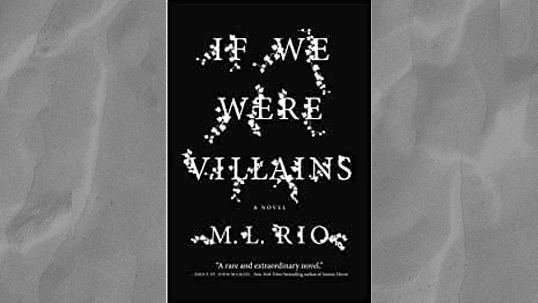Author: M. L. Rio

Oliver Marks is released from jail ten years after he is arrested on the campus of Dellecher Classical Conservatory. The man who arrested him, Detective Colborne, waits for Marks to fulfil his promise to him: shine light on the truth of what happened during Oliver’s final year at Dellecher. The story takes us back ten years tracing the events leading up to and following the crime for which Oliver was convicted. But did Oliver actually commit the crime for which he was held responsible?
In M.L. Rio’s If We Were Villains, Oliver Marks is one of seven Shakespearean actors who have survived the grueling Dellecher Classical Conservatory. After each year, students are purged from the program, but Oliver and his peers – Alexander, Filippa, James, Meredith, Richard, and Wren – have made it to the final year of the program. The seven of them, cohorted based on their year and program, live together in, what they call, The Castle – fitting for the kings and queens of campus. Each of the seven has a specific role to play, both on stage and in the group: ingénue, temptress, hero, sidekick, villain, tyrant, and chameleon. The individual archetypes lay the foundation for their on-stage and off-stage selves, blurring the lines of performance and reality. However, a production of Macbeth on Halloween switches up these usual roles and a dynamic shift begins to occur, each of them adapting to their new roles.
These Dellecher actors not only study Shakespeare, but live Shakespeare. Their lives quickly become their own kind of tragedy, mimicking the Bard’s famous works of Macbeth, Hamlet, Julius Caesar, and King Lear. The novel itself is even formatted in the traditional five-act structure of the Shakespearean tragedy; the crime that rocks the campus “less like a dénouement than a second-act peripeteia, the catalytic event that set everything in motion” (p. 193). Shakespeare becomes an omnipresent figure in the novel itself. Characters recite lines of Shakespearean plays as dialogue between each other, the roles they play on stage transcending their own character traits – as much as Oliver narrates the events of his final year, so too does William Shakespeare.
Yet, between monologue recitations for class, blocking rehearsal, and combat practice, these students ceremoniously present the small university lifestyle as they drink hot cider at their usual table in the school pub or drink tea with their professors before and after classes begin. While these students may seem too pretentious to reflect the average university student, their humanity and faults ground them. Despite the incessant quoting of Shakespeare, the vulnerability to pressures, passions, and emotions redeem each of the seven thespians and allow you to like them despite it all.
The novel is not a light read; drug and alcohol abuse caused by the stresses of higher education, physical abuse amongst friends, and ultimately murder, accelerate the plot. Rio’s careful characterization makes even the unforgiving characters likeable and her prose palpates the tensions on each page. At once a commentary on elite arts schools and an immersive experience of one, If We Were Villains allows the reader to be trapped in the academic life alongside the students. Classroom life mirrors real life and as the seven Dellecher students wrestle with the tragedy of Caesar being assassinated by his intimate friends on stage, they too wrestle with one of their own being assassinated.
